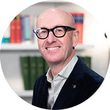- OT
- Life in practice
- Practitioner stories
- Through optometry eyes
Through optometry eyes
OT speaks to Angharad Hobby about her career

11 March 2017
What do you do on a typical working day?
It is very varied. Some days I'm based at City, University of London, others I’m at St Thomas’ Hospital gathering data, and a few days a month I am either practising at Eastbourne Hospital or teaching at the Johnson & Johnson Vision Care Institute. When I am at the university, I tend to work on data analysis and writing in the mornings, before seeing research participants, or my supervisors and colleagues for meetings, in the afternoon.
Which aspect of your current role inspires you the most?
I really enjoy the time I get to spend with my research participants. Of course, the data they provide me with is vital and wonderful, but they have all also got such unique stories and perspectives. Being able to answer some of their questions while also learning new things from them is a wonderful way to spend my days.
Where do you see the direction of optometry heading in the next five years?
Shared care seems like it is going to become a huge part of our practise and that is really exciting. I would also like to see further improvements in patient-practitioner communication to get our patients better informed and involved with their healthcare.
Who has been most influential in steering your career path?
It is hard to pinpoint any one person or event really. I have been fortunate to meet some truly lovely, kind people with really exciting ideas. I am a bit like a sponge, soaking up everything I can so I can learn more all the time and then progress from there.
What do you regard as being the most influential development to impact upon the clinical role of practitioners in recent years?
The commercial availability of optical coherence tomography completely changed the game. This happened just as I began my studies and with so much more information at practitioners’ fingertips, it was evident how much things were improving year on year.
If you had the power to change any aspect of the current remit of optometrists what would it be?
I wish we could communicate more about eye care and visual impairment to the general public. I know a lot of this is already going on, but I’d like to see an increase in public engagement, particularly as the ageing population may well bring an increase in visual issues with it.
Advertisement


Comments (0)
You must be logged in to join the discussion. Log in